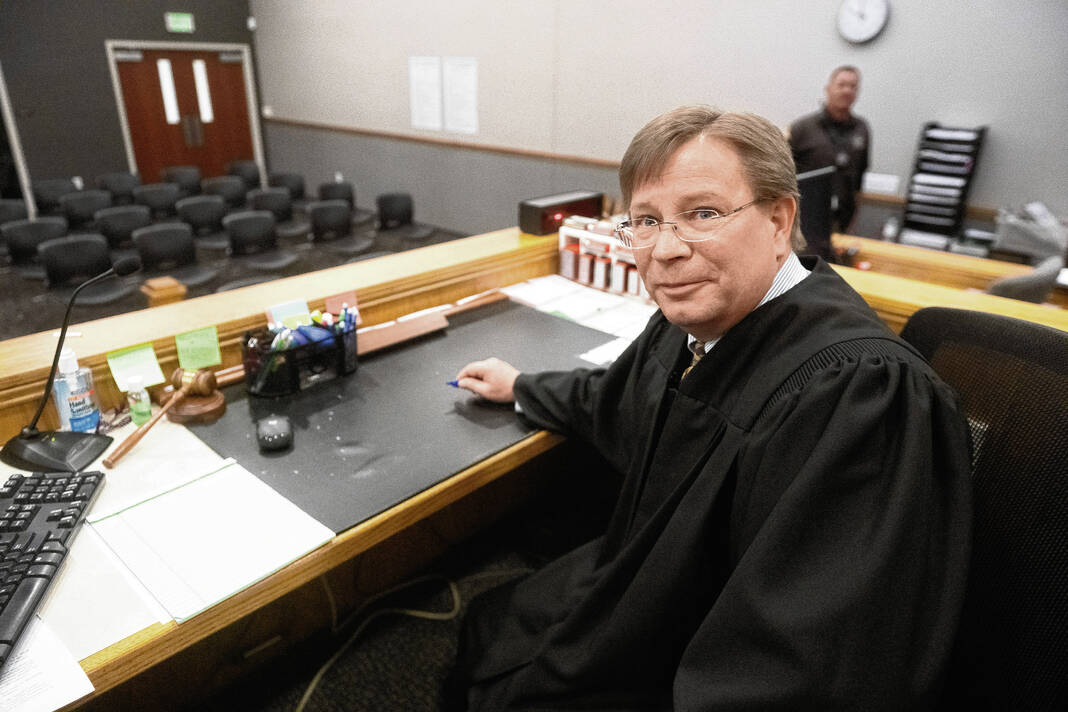NEW PALESTINE — Recalling how he was standing less than 20 feet away from the most powerful judicial officials in the United States — the Justices in the U.S. Supreme Court — longtime real estate attorney Bill Niemier said it was a surreal moment.
“I almost had to pinch myself,” Niemier said. “The whole experience was humbling, pretty phenomenal and all-around fantastic.”
Getting a chance to practice law in the nation’s highest court could be considered the pinnacle moment for any attorney. Niemier is now qualified to do just that. Attorneys may be admitted to practice law at the U.S. Supreme Court either on written motion or on oral motion during a regular court session.
Niemier, who has dedicated his life’s work to the legal profession, was one of 12 Indiana attorneys recently selected to travel to Washington D.C. and be sworn-in by the Justices to practice law in the U.S. Supreme Court. That is something only a small percentage of attorneys, some 6% in the United States, can do.
“By far, the biggest concentration of lawyers who do practice law at the Supreme Court live in Washington, D.C.,” Niemier said.
Niemier is a Wabash College and McKinney School of Law School graduate who has been practicing law in Indiana for some 33 years with a concentration focused on real estate. Niemier also sits as a judicial official, a pro tem judge in several different small claims courts in various counties around the state, something he’s done for several decades.
“And now I am also licensed and admitted to practice law before the United States Supreme Court,” Niemier said.
The process to get that opportunity isn’t an easy one. For several years, an attorney friend of Niemier’s who had qualified several years ago had continually told Niemier he should apply, but Niemier says he never took the suggestion seriously.
“It was really kind of fate because I had just had another conversation about it with my attorney friend and the very same day I received an email from the Indiana State Bar Association announcing they were looking to put a group of Indiana attorneys together to do this,” Niemier said.
That coincidence convinced Niemier to go through an application process. Once selected, he had to go through a background check and meet other thresholds. When that was all done, it was a waiting game, but Niemier received an email saying he had been selected.
He noted the whole notion of traveling to Washington D.C. and going to the Supreme Court to be sworn-in is a pretty big deal. The trip not only gave him an opportunity to be sworn-in to practice law there, but to also visit the highest court in the land and watch a real U.S. Supreme Court proceeding.
“They were having oral arguments when we were there, and as a member of the bar in the courtroom, they had a designated area for members of the bar to observe and I did that,” Niemier said.
He listened to details of a case between the Securities and Exchange Commission v. Jarkesy, a financial advisor in Texas.
“The second the Justices were done with us, they immediately called their one case for the day and they received the oral arguments, and watching that was a neat experience,” he said.
However, the first order of business the day Niemier was there was the Justices swearing in a couple dozen attorneys, including himself.
“The day we were there, they said it was a pretty high admissions number,” Niemier said. “There were five individuals who did it on their own, the group of 12 from Indiana and then there was a group of 10 military attorneys.”
Afterward, Niemier noted each of the Justices, John G. Roberts Jr., Chief Justice of the United States; Clarence Thomas, Associate Justice; Samuel A. Alito Jr., Associate Justice; Sonia Sotomayor, Associate Justice; Elena Kagan, Associate Justice; Neil M. Gorsuch, Associate Justice; and Brett M. Kavanaugh, Associate Justice, congratulated the attorneys from a distance.
“Based on the number of people who were in the courtroom, which is relatively small, but is very, very, very fancy, I was 15 to 18 feet away from the Justices who were up on the bench,” Niemier said.
One of the other things Niemier had to do when going into the Supreme Court was travel through three security check points, all with metal detectors, and he also had to discard all his electronic devices, including his cell phone, which meant there was no opportunity for photos inside the court or of the Justices.
“I’ve visited clients in very secure prisons and have gone through less security than that,” Niemier said. “They run a really tight ship there.”
While Niemier, who is also a member of the New Palestine Town Council, notes the odds of him ever having to take a case to the U.S. Supreme Court might be small, just knowing he can now practice law in the highest court in the land is interesting.
“That would be an opportunity I wouldn’t ever turn down,” Niemier said.








